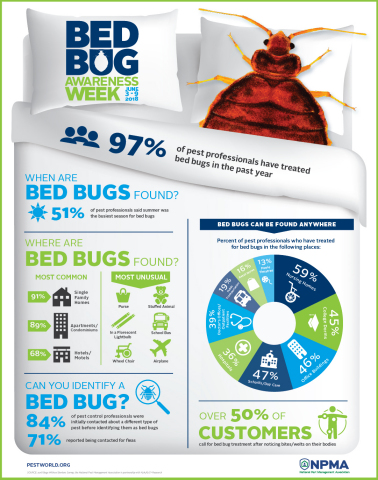Pest-Proofing Your Yard: Tips For Keeping Outdoor Bugs Away
Pest-Proofing Your Yard: Tips For Keeping Outdoor Bugs Away
Blog Article
Content Writer-Thorpe Qvist
Visualize your yard as a sanctuary, an area of serenity and charm. Nonetheless, the visibility of outside bugs can swiftly disrupt this picturesque photo. What happens if there were straightforward yet reliable means to keep these undesirable site visitors at bay and secure your yard sanctuary? By following a couple of useful suggestions and implementing all-natural methods, you can create an unified exterior area where your plants can flourish undisturbed.
Natural Insect Deterrents
To keep bugs far from your yard normally, plant aromatic natural herbs like mint and lavender. These aromatic plants not just include appeal to your garden however also function as effective pest deterrents. Insects like mosquitoes, flies, and also some garden-damaging pests are pushed back by the strong fragrances given off by these herbs. Just positioning them purposefully around your garden can aid develop a natural obstacle against undesirable insects.
In addition to mint and lavender, take into consideration planting other natural herbs like rosemary, basil, and lemongrass to better boost your yard's pest-proofing abilities. These natural herbs not just work as all-natural repellents but additionally have actually the added benefit of being useful in food preparation or crafting self-made solutions.
Strategic Plant Placement
Consider the layout of your garden and the kinds of plants you have to purposefully position them for optimum pest-proofing efficiency.
Beginning by organizing plants with similar resistance to bugs together. By doing this, you can produce a natural barrier that hinders parasites from spreading out throughout your garden.
Additionally, putting pest-repelling plants like marigolds, lavender, or mint near more vulnerable plants can aid secure them. High plants, such as sunflowers or corn, can act as a shield for shorter plants versus bugs like rabbits or ground-dwelling pests.
Remember to leave sufficient space between plants to boost air circulation and reduce the threat of conditions that pests might bring.
Moreover, think about growing strong-smelling herbs like rosemary or basil near at risk plants to perplex bugs' senses and make it harder for them to locate their targets.
Reliable Bug Control Approaches
For combating garden insects properly, executing a multi-faceted parasite control method is essential. Start by motivating all-natural predators like birds, ladybugs, and praying mantises to help maintain bug populations in check. Introducing plants that draw in these useful bugs can aid in parasite control. In https://how-to-get-rid-of-snakes95162.blogs100.com/27017140/discover-the-surprise-presence-of-damaging-termites-in-your-residence-prior-to-it-ends-up-being-a-severe-trouble , exercising good yard health by eliminating particles and weeds where bugs may conceal can make your yard less hospitable to unwanted site visitors.
Consider utilizing physical obstacles such as row cover fabrics or netting to safeguard vulnerable plants from pests like caterpillars and birds. Using organic chemicals like neem oil or insecticidal soap can likewise be effective against specific bugs while being less dangerous to helpful pests and the environment. It's crucial to revolve your plants each period to prevent the buildup of insect populations that target particular plants.
Frequently check your plants for indications of pest damage so you can do something about it immediately. By incorporating these techniques and remaining cautious, you can effectively regulate garden bugs and appreciate a flourishing, pest-free garden.
Verdict
So, there you have it - with the ideal techniques, you can keep pesky exterior insects far from your yard and assist your plants prosper.
Did read here understand that growing mint has been revealed to push back insects and other pests, reducing the need for hazardous chemicals by approximately 60%?
By including natural deterrents and smart planting methods, you can produce an attractive and pest-resistant garden sanctuary for you to appreciate.
